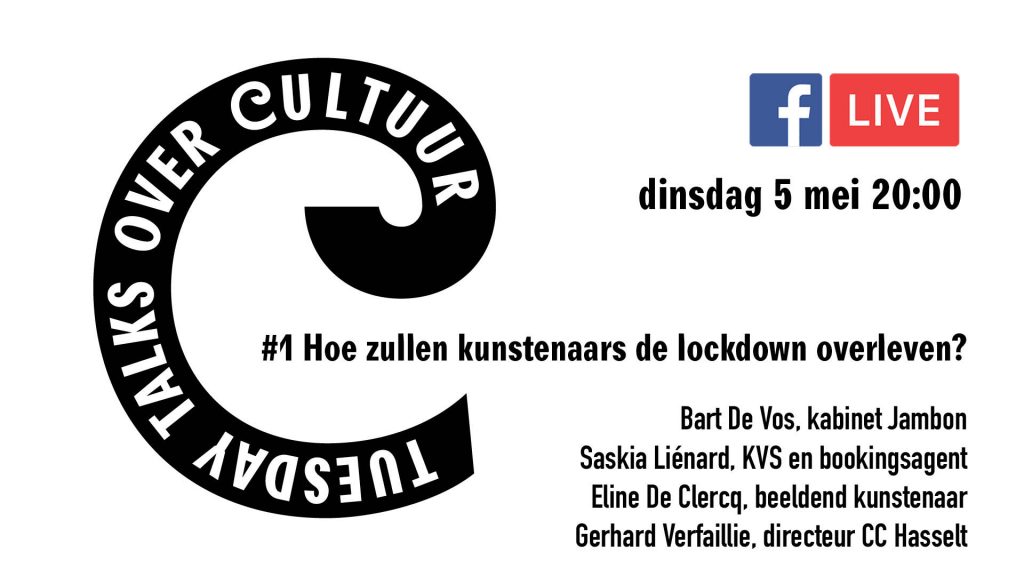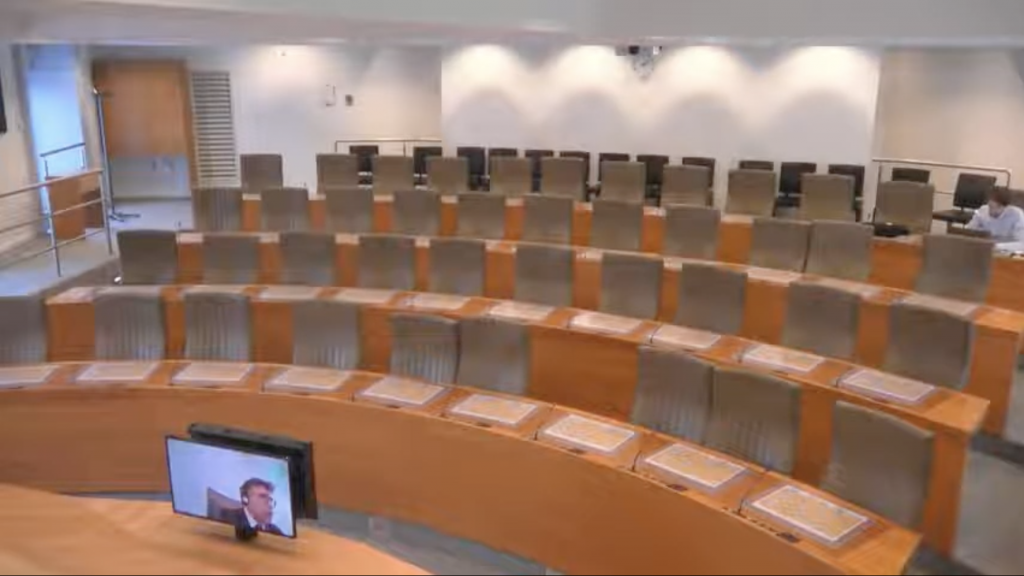Dear all,
Hope you are okay.
The virus didn’t get SOTA and our platform is more active than ever. The working groups are hard at work alongside and with each other on different initiatives and themes.
Below more about our Tuesday Talks series on Facebook, info about our SOS Relief solidarity app and a report from the Culture Committee last Thursday.
In solidarity,
State of the Arts

TUESDAY TALKS: ABOUT THE FUTURE OF CULTURE
Live debates are currently out of the question, but it can also be fun online. In between all the virtual exploitations of artists, the Tuesday Talks make time for dialogue and reflection. Every week we talk for one hour with four speakers from their living rooms. You too can just follow in your chair, and suggest even better questions (and answers?) live.
Now Tuesday: how will artists survive the lockdown?
For artists and cultural workers there is no exit in sight – at least until the end of August. What does that mean, both financially and artistically? A discussion about the current support measures and their gaps, the working conditions in the cultural sector and possible alternatives.
Join us on our facebook page. You don’t have to sign up, you can just watch.
Tuesday talks is an initiative of the State of the Arts in collaboration with Kunstenpunt and rekto:verso.

SOS RELIEF
Over the past few weeks, the State of the Arts fair practice group has been working hard on an action towards those who are falling between the cracks. With ‘State of Solidarity Relief’ or ‘SOS Relief’ we can support each other directly and personally. With this we want to make a difference for people who are not eligible for government support and are in urgent need.
Small donations, big difference
People really do want to give, but sometimes have trouble with the large anonymous bucket in which their contribution ends up. That’s why we made a tool that enables a direct transfer.
How does it work?
On sosrelief.net you indicate whether you can give 50, 100 or a maximum of 400 euros. When we find a match with someone who needs the same amount, you will receive an e-mail with the bank account number, and – if specified – a motivation from the recipient. So you know who your money will go to and why. Of course, we take the privacy rules into account.
You are the receiver? No questions asked!
A large group of people now urgently need support for basic needs. We don’t want to waste time by drawing up conditions and by asking for motives. Paying rent and groceries can’t wait until tomorrow.
Successful test phase
We currently have about 40 people connected to each other who together have exchanged 4000 euros. Three people from the State of the Arts were trained as administrators and control the (manual) e-mail traffic. We made a video in which we tell why we believe this initiative is necessary.
We need you!
Requests are coming in at a fast pace, and we urgently need more people who can share in what they have. In the coming weeks we will focus on improving the website and a campaign via social media, radio and flyers.
You too can help us with the announcement of the tool. That’s why we will send you an e-mail in our next newsletter that you can forward to your contacts. Do you have more ideas about the promotion of SOS Relief or would you like to do a flyer tour in your neighbourhood? Mail to presss@state-of-the-arts.net.
Experiment
We see SOS-relief as an experiment to do things differently. It has flaws and we are open to suggestions. Mail your questions to sosrelief@state-of-the-arts.net.

COMMITTEE CULTURE FLEMISH PARLIAMENT – APRIL 30, 2020
On Thursday 30 April, the Committee on Culture of the Flemish Parliament again discussed the impact of the corona crisis on the cultural sector. SOTA remembers from this:
1. Minister Jambon freezes his early phasing out of gesco-means by the end of 2020 (a saving of 1 million euros) and sits down around the table with the eight organisations affected (e.g. Elcker-I, Fakkeltheater…) for made to measure alternatives. “If that does not succeed, we will fulfil the commitments made by the Flemish Government in the past towards those organisations”. So the Minister guarantees the organisations a solution after all.
2. The recent additional 4 million for the second round of project grants has been found entirely from the general budget resources. Jambon: “So not a single euro has been shifted for it within the culture budget, nor is it a pre-payment on the Emergency Fund. So it does involve extra money.
3. Groen drew the minister’s attention to SOTA’s concrete proposals concerning the extension of temporary unemployment for unsigned short-term contracts. Sp.a, Open Vld and CD&V also expressed the wish that a solution would be found quickly. Minister’s answer: “I am in contact with the cabinet of Federal Minister Muylle regarding the artists’ statute and the regulation on temporary unemployment. The problems of this regulation have been raised. Cultuurloket is following this up on my question very closely. I am not yet in a position to make any further statements about whether and to what extent the scheme will be amended. This week Minister Jambon did send a letter to Federal Minister of Work Muylle , asking to extend the current temporary unemployment regulations as long as there is no full and definitive exit of the lockdown
4. Around 15 May, the exact distribution of the 200 million provided for in the Emergency Fund for culture, youth, media and floriculture will be clarified… : how much is specifically provided for culture? For that amount, the Culture administration will then work out a plan of approach for emergency support. Almost all parties argued in favour of an increase of this 200 million and an extension to also non-subsidized organisations, but Minister Jambon emphasized that the Flemish government at this moment continues to rely on this amount. He did, however, hold an opening for possible expansion. “That exercise has not yet come to its end. I am well aware that sticking too strictly to ‘only subsidised organisations and nothing else’ is not tenable in the end”.
5. Will individual artists also be able to fall back on support from the Emergency Fund? Minister Jambon: “The target group of the Emergency Fund for Culture has not yet been fully defined. I am very aware of the difficult situation of many freelancers, and I am also aware that the sector is much larger than the subsidised piece (…) In order to identify the weakest, the subsidised organisations are a necessary link to be able to bridge the gap, but I am also aware that many freelancers are active among the non-subsidised actors. I will consider how I can protect them (…) So we pay attention to the vulnerable links in the value chain: artists with daily contracts, self-employed workers in secondary occupations, stage technicians, suppliers (…) I expect the subsidised institutions to support the vulnerable by, for example, paying out a portion of the agreed allowances”.
At the same time Ecolo and Groen submitted a bill to the House of Representatives on support measures for artists, but it was rejected by a vote.
In any case, we have been set up with the Minister’s positive attitude and hope that in the next few weeks he will translate this into real helplines for the most precarious groups in the cultural field that are still falling between the cracks.
